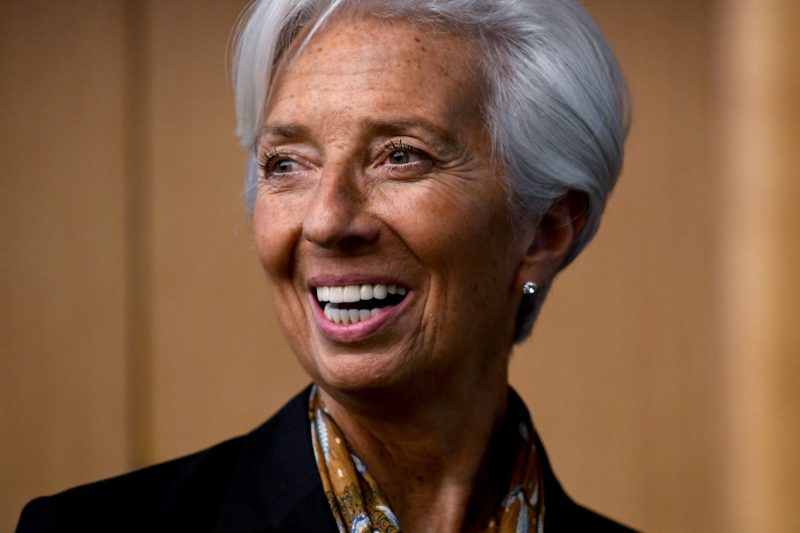Christine Lagarde continues to break glass ceilings
International Monetary Fund Managing Director Christine Lagarde will accomplish another first, as she takes over the helm of the European Central Bank (Mohd RASFAN)
Washington (AFP) – Christine Lagarde has made a career out of breaking glass ceilings in the halls of international finance and is now poised to break one more, leading the European Central Bank.
The former lawyer was the first woman to serve as finance minister from any Group of Seven nation and then the first to lead the International Monetary Fund.
The silver-haired Lagarde, 63, took the helm in 2011 in the aftermath of the global financial crisis, and is credited with steering the Washington-based IMF through turbulent economic waters, including handling of the Greek economic collapse.
Her second five-year term as managing director of the global crisis lender ends in two years, which makes her the second leader of a global financial institution to leave early to move to another position, following Jim Yong Kim’s decision early this year to step down as president of the World Bank.
But as she prepares for an eight-year term leading the ECB in November, she will be in a familiar place as trailblazer at a difficult time, accustomed to being the only woman in the room.
She was the first female chairman of a major global law firm — the US-based Baker and McKenzie — and was France’s first woman economy minister when named by then-President Nicolas Sarkozy in 2007.
She speaks openly about the sexism she has faced in her career, difficulties she faced having a family and a career, and is a fierce advocate for advancing women worldwide.
– Fierce advocate for women –
She makes a strong economic case for having more women in positions of power, including saying the financial crisis may not have happened if Lehman Brothers had instead been “Lehman Sisters.”
“Greater emphasis on women in organizations leads to better governance and decision-making. I maintain that women have a different approach to risk than men,” she told Elle magazine earlier this year.
“Our studies have shown that, by removing barriers to women’s participation in the labor market, GDP could increase significantly,” and productivity would rise, increasing wages for men and women.
However, she is not an economist which means she will be another first: the first ECB president who did not lead a national central bank. This could make her a target for criticism, especially if the management of the economic slowdown in Europe goes wrong, amid Brexit and rising trade tensions.
But one former IMF official, said her leadership of the fund, with its 189 members, makes her “is exceptionally qualified” to run the ECB.
And another associate, who asked not to be identified, said “She knew how to impose the calm without posing as morally superior,” instead displaying “a touch of humanity.”
The stamina of the former synchronized swimmer, who represented France as a youth, is legendary. She still exercises everyday — sometimes in her seat during meetings — has not eaten meat in 40 years, and told Elle of her skills in pretending to drink wine at working dinners.
Born to middle-class teacher parents, she went to school in the northern port city of Le Havre and at a prestigious girls boarding school outside of Washington before going on to study at universities in France.
– Praise and Blemish –
There are many fans of Lagarde in financial and diplomatic circles.
“Christine Lagarde can take credit for bequeathing an IMF that has become the premier international financial institution,” said Masood Ahmed, a former IMF official who now leads the Center for Global Development, an anti-poverty think tank.
“She brought a rare combination of political sensitivity, personal empathy and tough but loyal leadership for her institution at a trying time for the world economy. She will be a hard act to follow,” Ahmed told AFP.
She has been adamant that trade tensions are the “principal threat” to the global economy but acknowledges the strains of globalization and digitalization of the economy, which have left some workers behind and helped to fuel the rise of populism.
Despite a stellar career, her record suffered one significant blemish, when she was convicted in a French court in 2016 for failing to challenge a 404-million-euro ($422 million) award to flamboyant French businessman Bernard Tapie in 2008 over the sale of sportswear brand Adidas.
However, the court did not impose a fine or jail sentence, as had been the case for some of her predecessors.
Dominique Strauss-Kahn, a former French finance minister like Lagarde, resigned in disgrace in 2011 after being accused of attempted rape in a New York hotel.
And Rodrigo Rato, a former Spanish economy minister who ran the IMF from 2004-2007, is in prison for embezzlement.
burs-hs/dg
Disclaimer: Validity of the above story is for 7 Days from original date of publishing. Source: AFP.


